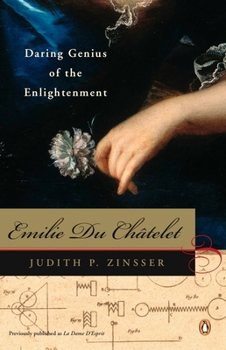Emilie Du Chatelet: Daring Genius of the Enlightenment
Select Format
Select Condition 
Book Overview
The scintillating life of the most brilliant woman of the French Enlightenment, the lover of Voltaire and translator of Newton Gabrielle Emilie le Tonnelier de Breteuil was born to the highest circles... This description may be from another edition of this product.
Format:Paperback
Language:English
ISBN:0143112686
ISBN13:9780143112686
Release Date:November 2007
Publisher:Penguin Publishing Group
Length:400 Pages
Weight:0.80 lbs.
Dimensions:0.8" x 6.0" x 8.4"
Age Range:18 years and up
Grade Range:Postsecondary and higher
Related Subjects
Biographical Biographies Biographies & History Biography & History Europe France Historical History Literary Criticism Literary Criticism & Collections Literature & Fiction Modern (16th-21st Centuries) Professionals & Academics Scientists Specific Groups Women World World LiteratureCustomer Reviews
4 ratings
Fascinating, Feminist, Fabulous
Published by Thriftbooks.com User , 14 years ago
It's incredible to me that Emilie Du Chatelet's story is not more widely known. She was brilliant, sexy, witty, adventurous, and beautiful. Hers is a story told SO well by Judith Zinsser that I immediately read everything I cold find about Emilie. Judith's is athe best version that I could find - she obviously knows the woman, the science, and the culture and it provides for a fascinating true story of a stunning woman genius.
Amazingly detailed biography of female philosophe
Published by Thriftbooks.com User , 15 years ago
The soft cover version of Dame d'Espirit, Zinsser's Emilie du Chatelet explores the life of a 18th century woman driven to expand on the scientific and philosophical debates of her day, while also capable of relishing the social and political duties of upper-class women in Enlightenment France. Zinsser uses an incredible array of historical sources, from Chatelet's writings, to Voltaire's letters, to inventories of 18th century French homes in her vivid recreation of the period and Chatelet's life. A refreshing and decidedly feminine perspectives on Voltaire and the Republic of Letters is welcome here as we see both historical and biographical paradigms rejected and replaced with new scholarship. Zinsser reasserts du Chatelet's place as a scientist and philosopher in her own right, dispelling much of the sexist and erroneous slander directed at du Chatelet in the last few centuries. As a historian, I am intrigued and delighted with this book. As a reader, there is a significant portion of this novel that could easily be called boring - in-depth explanations of translating Newtonian theory seriously inhibits the flow of this biography as popular literature. Still, the wonderful detail and insight make it worth a boring chapter or two. In what other book could you find a discussion of Newtonian physics alongside an explanation of bathroom habits at Versailles?
Miss Leading
Published by Thriftbooks.com User , 15 years ago
This book is, word for word, the as "La Dame a' Esprit", but in Softcover form. Very misleading if you are a collector of works on Ms Emilie, as I am. Buy one or the other but not both.
" 'My exterior is always the image of my heart.' "
Published by Thriftbooks.com User , 16 years ago
Gabrielle Émilie Le Tonnelier de Breteuil, Marquise Du Châtelet wrote her last lover, the younger army officer Jean François de Saint-Lambert, this self-confident statement (" 'My exterior is always the image of my heart.' ") about herself. In Judith P. Zinsser's biography of this extraordinary eighteenth-century woman, the marquise does appear to have lived her high-born, offbeat, and accomplished forty-two years very much that way. Judith P. Zinsser's softcover Emilie Du Châtelet : Daring Genius of the Enlightenment (previously published in hardcover with the title La Dame d'Esprit) is a meticulously researched biography that traces Du Châtelet's "unorthodox intellectual pursuits" as well as her family life, her life in the courts of French and Polish kings and queens, and her too public (and often mocked and derided) extramarital life, mainly with the reknown Voltaire. The exact nature of Du Châtelet's early education isn't known, but after her marriage and several children (of whom only two survived into adulthood), the marquise sought tutors for herself. They, and a great deal of reading taught her geometry, physics, even calculus. Living with Voltaire provided her with cerebral stimulation, some early guidance and the opportunity to collaborate on literary pieces and, to her greater interest, scientific papers. As time went on, Du Châtelet became more and more independent of opinion; Voltaire, edgily teasing, called her " 'Emilia Neutonia'" in part because of one of their disagreements about physics: whether Newton's definition of "force, the modern concept of 'momentum'," was correct. Du Châtelet favored Leibniz's formula (basically, kinetic energy) instead, and she wrote as much in her Institutions de physique (Lessons in Physics), a book in which she tackled, among other big topics: space, time, and matter. This book was published`in 1740, when she was thirty-four. She wrote other scientific works, often considered derivative by her contemporaries and future generations, but which contained her own unique syntheses and conclusions. Her greatest project, on which she labored mightily during her final pregnancy but which was not published until years after her death, was a translation of Newton's Mathematical Principles of Natural Philosophy. It remains the only French language translation in use. Zinsser sedulously recreates the life and times of Du Châtelet with a historian's scruples. Often direct documentation of Du Châtelet's particulars aren't in the record. For example, no letters between Du Châtelet and Voltaire have survived -- at least none known. And there are precious few personal facts of Du Châtelet's childhood. So, Zinsser makes due with phrases such as "she may have" and "perhaps she." The reader garners a great deal of knowledge about the conventions, the styles, the economic realities, and the class structure, but the threadbare sections in Du Châtelet's personal history cannot be denied. As a result, Emilie Du Ch





